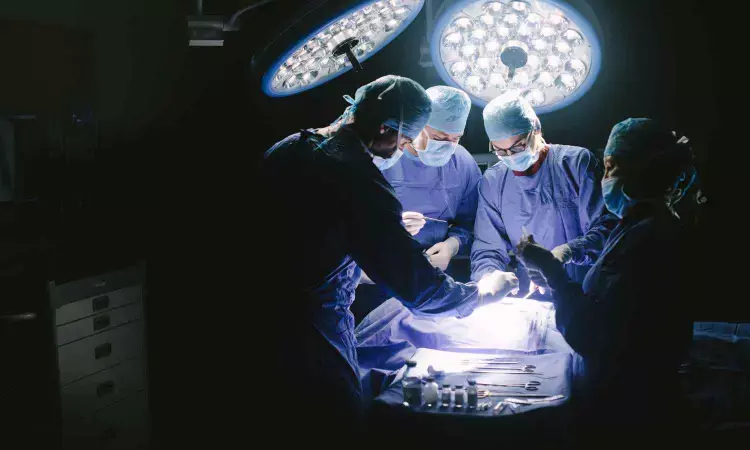- Home
- Medical news & Guidelines
- Anesthesiology
- Cardiology and CTVS
- Critical Care
- Dentistry
- Dermatology
- Diabetes and Endocrinology
- ENT
- Gastroenterology
- Medicine
- Nephrology
- Neurology
- Obstretics-Gynaecology
- Oncology
- Ophthalmology
- Orthopaedics
- Pediatrics-Neonatology
- Psychiatry
- Pulmonology
- Radiology
- Surgery
- Urology
- Laboratory Medicine
- Diet
- Nursing
- Paramedical
- Physiotherapy
- Health news
- Fact Check
- Bone Health Fact Check
- Brain Health Fact Check
- Cancer Related Fact Check
- Child Care Fact Check
- Dental and oral health fact check
- Diabetes and metabolic health fact check
- Diet and Nutrition Fact Check
- Eye and ENT Care Fact Check
- Fitness fact check
- Gut health fact check
- Heart health fact check
- Kidney health fact check
- Medical education fact check
- Men's health fact check
- Respiratory fact check
- Skin and hair care fact check
- Vaccine and Immunization fact check
- Women's health fact check
- AYUSH
- State News
- Andaman and Nicobar Islands
- Andhra Pradesh
- Arunachal Pradesh
- Assam
- Bihar
- Chandigarh
- Chattisgarh
- Dadra and Nagar Haveli
- Daman and Diu
- Delhi
- Goa
- Gujarat
- Haryana
- Himachal Pradesh
- Jammu & Kashmir
- Jharkhand
- Karnataka
- Kerala
- Ladakh
- Lakshadweep
- Madhya Pradesh
- Maharashtra
- Manipur
- Meghalaya
- Mizoram
- Nagaland
- Odisha
- Puducherry
- Punjab
- Rajasthan
- Sikkim
- Tamil Nadu
- Telangana
- Tripura
- Uttar Pradesh
- Uttrakhand
- West Bengal
- Medical Education
- Industry
40-Hz Light Stimulation Reduces Emergence Delirium After Pediatric Vascular Malformation Surgery: JAMA

Researchers have found in a randomized clinical trial that 40-Hz light stimulation significantly lowered the incidence of emergence delirium in children undergoing vascular malformation surgery, highlighting the potential of nonpharmacologic sensory interventions for delirium prevention. Emergence delirium is a frequent and distressing complication following pediatric anesthesia, characterized by confusion, agitation, and inconsolable behavior during recovery.
It can prolong post-anesthesia care unit stays, increase caregiver stress, and in some cases, pose a risk of self-injury to the child. Traditional pharmacologic interventions, while effective, carry risks of oversedation, respiratory depression, and delayed recovery. This study aimed to investigate a noninvasive, low-risk approach to mitigate this complication using rhythmic light stimulation.
In the trial, children receiving sevoflurane anesthesia were randomly assigned to either a 40-Hz light stimulation group or a control group without light intervention. The stimulation was delivered in a controlled environment during the surgical procedure.
The primary outcome measured was the incidence of emergence delirium postoperatively, assessed with standardized pediatric delirium scales. Results indicated a substantial reduction in delirium incidence in the 40-Hz light group, with children exhibiting calmer behavior and smoother recovery profiles. Importantly, the intervention did not result in adverse effects, suggesting that it is both safe and well-tolerated. Secondary analyses examined the duration and severity of delirium episodes, revealing that children in the stimulation group experienced shorter and less severe episodes when delirium did occur.
These findings underscore the potential of nonpharmacologic sensory interventions in pediatric perioperative care. While 40-Hz light stimulation appears promising, the authors emphasize the need for larger, multicenter trials to validate these results and establish standardized protocols for clinical use. The study also raises intriguing questions about the underlying neurophysiological mechanisms, as 40-Hz rhythmic stimulation may interact with neural oscillations involved in attention, arousal, and sensory processing, providing a biologically plausible pathway for reducing delirium. If confirmed, this approach could offer a low-risk, easily implementable strategy to improve pediatric anesthesia outcomes, reduce healthcare burden, and enhance patient and caregiver experiences.
Dr. Shravani Dali has completed her BDS from Pravara institute of medical sciences, loni. Following which she extensively worked in the healthcare sector for 2+ years. She has been actively involved in writing blogs in field of health and wellness. Currently she is pursuing her Masters of public health-health administration from Tata institute of social sciences. She can be contacted at editorial@medicaldialogues.in.
Dr Kamal Kant Kohli-MBBS, DTCD- a chest specialist with more than 30 years of practice and a flair for writing clinical articles, Dr Kamal Kant Kohli joined Medical Dialogues as a Chief Editor of Medical News. Besides writing articles, as an editor, he proofreads and verifies all the medical content published on Medical Dialogues including those coming from journals, studies,medical conferences,guidelines etc. Email: drkohli@medicaldialogues.in. Contact no. 011-43720751


